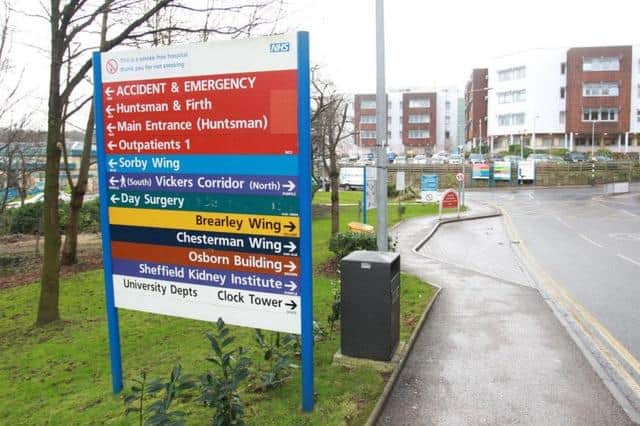Winter pressures placing big strain on hospitals in Sheffield, NHS data shows
and live on Freeview channel 276
During winter, NHS England publishes weekly reports which give insight into how well hospital trusts are managing – looking at ambulance delays, bed occupancy and long stays in hospitals.
Between February 17 to 23, Sheffield Teaching Hospitals saw 967 patients brought by ambulance to A&E at the trust. The busiest day was Monday, when 155 patients arrived.
Advertisement
Hide AdAdvertisement
Hide AdOver the week, 46 arrivals waited 30 minutes or more to be transferred to the emergency department – despite NHS guidelines saying all patients should be transferred within 15 minutes.


General and acute wards at the trust were 97.2 per cent full on average last week – significantly above the 85 per cent rate the British Medical Association suggests should not be exceeded to ensure safe patient care.
The occupancy rate was slightly lower than the 98.1 per cent recorded the previous week.
Above 92 per cent, NHS Improvement says that deterioration in A&E performance begins to accelerate.
Advertisement
Hide AdAdvertisement
Hide AdSheffield Teaching Hospitals Trust was more than 92 per cent full every day last week.
On average, the trust had 1,367 beds available to use each day last week, including six escalation beds, which are used in emergencies and periods of high demand. Just 38 beds were free on an average day.
On Sunday, 710 patients had been in hospital for seven days or more at Sheffield Teaching Hospitals Trust. They accounted for 53 per cent of all beds occupied.
Occupying 19 per cent of beds, 258 patients had been in hospital for three weeks or longer.
Advertisement
Hide AdAdvertisement
Hide AdNorovirus, also called the winter vomiting bug, causes vomiting and diarrhoea. As it is contagious, staff can close beds in hospital wards to prevent it spreading.
When the disease was at its peak at Sheffield Teaching Hospitals Trust last week, 26 beds were closed.
The previous week, norovirus closed up to 10 beds.
Michael Harper, chief operating officer at Sheffield Teaching Hospitals, said: “This winter, despite treating nearly 10,000 more patients, we have cancelled fewer operations than last year, improved ambulance turnaround times, reduced the number of people waiting more than four hours for a bed by almost 40 per cent and cut the number of reportable patients whose discharge is delayed from on average 100 a week to less than 45.
“This is thanks to the dedication and support of our 17,000 staff across hospital, community and support services. In recent weeks despite growing numbers of A&E attendances and emergency patients, we have also hit the 95 per cent four-hour wait in A&E standard on a number of days.
Advertisement
Hide AdAdvertisement
Hide Ad“We are never complacent and continue to do all we can to treat patients in a timely way. Safety is our top priority and we always consider this when making decisions about bed use and staffing availability.”
“We continue to receive positive patient feedback and hundreds of thank you cards every week in gratitude for the care our staff work hard to provide.”